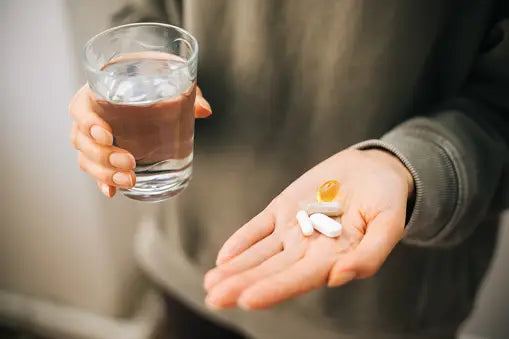

Whey Vs EAA: Which is More Anabolic?
Table of Contents
Whey Vs EAA: Which is More Anabolic?
A Brief Analysis of Protein/ EAA Consumption for Muscle Hypertrophy.
Resistance exercise is a never ending cycle of breaking down muscle and building it back up again. So what supplements can help you recover faster? Of course many bodybuilders take either a whey protein shake or throw some BCAA down after resistance exercise because they do the same thing right? There are differences between the two as some studies have found. The BCAA’s are interesting because they are metabolized in the muscle, rather than in the liver. This means that BCAA’s can be relied on as an actual energy source during exercise, and could therefore prevent premature muscle breakdown. One study showed exercising individuals who got BCAA’s had better exercise efficiency and exercise capacity compared to a group that didn’t get BCAA’s.
When you supplement with BCAA’s, they can decrease the blood indicators of muscle tissue damage after long periods of exercise, thus indicating reduced muscle damage, and they also help maintain higher blood levels of amino acids. Both are great for stimulating bet protein synthesis and enhancing muscle recuperation, but there are subtly differences in the two.
In a interesting and free peer reviewed research of the literature, please check out the review by Dr. Hulmi, Lockwood, and Stout tited, “Effect of protein/essential amino acids and resistance training on skeletal muscle hypertrophy: A case for whey protein.” The review makes some interesting points that bodybuilders should consider when trying to increase muscle mass.
1.) Small, frequent does of protein/EAA: Interestingly, studies have suggested that you don’t have to eat pounds and pounds of meat to get the full optimization of protein synthesis. For example, utilizing egg protein or essential amino acids, there seem to indicate a plateau in protein synthesis from the ingestion of between 20-40 g of protein, or approximately 9-10 g of EAA, respectively1. That’s it!!! In fact, a recent study reported that there were no difference in protein synthesis was observed when after resistance exercise, athletes consumed either 30 or 90 g of protein from beef2. So it seems like small and frequent ingestion of protein/EAA is better for maintaining protein kinetics over the day and maintaining an anabolic state.
2.) The Missing Link in Whey Protein? So if you think it’s just essential amino acids that important for recovery, your partly right but there is something else in whey protein that gives a little bit of an edge for recovery that you can’t get from just taking essential amino acids. For example, when untrained subjects consumed either 25 g of whey protein isolate or 25 g of its whey protein hydrolysate, peak isometric torque was fully recovered by 6 hours post-fatiguing eccentric exercise for subjects consuming the whey protein hydrosylate, whereas recovery was still significantly depressed by 24 hours post-exercise in both the whey protein isolate group. So here you have two protein sources with identical essential amino acid composition, but there was something in the hydrolysate that enhanced recovery above whey protein isolate. Additionally, a earlier study conducted this year reported that acute consumption of a whey protein drink ~approximately 15 grams, in elderly men and women at rest resulted in greater muscle protein kinetics than consumption of an equal component of EAAs (6.72 g). So this shows that there is an missing ingredient that stimulates additional increases in protein synthesis beyond just EAA. It could also be as mentioned in the review paper that, “new discoveries continue to surface regarding bioactive peptides present within dairy, and specifically in whey that may facilitate improved recovery and antioxidant capacity to support physiological adaptations to exercise 4. ”
Don’t get me wrong, I think all dieting bodybuilders should be taking a some essential amino acids between meals, but it seems that there is something in whey protein that gives it a little something extra kick for anabolism and muscle recovery. Both are well worth the money, its just a matter of preference.
- Moore DR, Robinson MJ, Fry JL, Tang JE, Glover EI, Wilkinson SB, Prior T, Tarnopolsky MA, Phillips SM: Ingested protein dose response of muscle and albumin protein synthesis after resistance exercise in young men. Am J Clin Nutr 2009 , 89:161-168.
- Symons TB, Sheffield-Moore M, Wolfe RR, Paddon-Jones D: A moderate serving of high-quality protein maximally stimulates skeletal muscle protein synthesis in young and elderly subjects. J Am Diet Assoc 2009 , 109:1582-1586.
- Buckley JD, Thomson RL, Coates AM, Howe PR, DeNichilo MO, Rowney MK: Supplementation with a whey protein hydrolysate enhances recovery of muscle force-generating capacity following eccentric exercise. J Sci Med Sport 2010 , 13:178-181.
- Yalcin AS. Emerging therapeutic potential of whey proteins and peptides. Curr Pharm Des. 2006;12:1637–1643.
- 5.Hulmi JJ, Lockwood CM, Stout JR. Effect of protein/essential amino acids and resistance training on skeletal muscle hypertrophy: A case for whey protein. Nutr Metab (Lond). 2010 Jun 17;7:51.

















